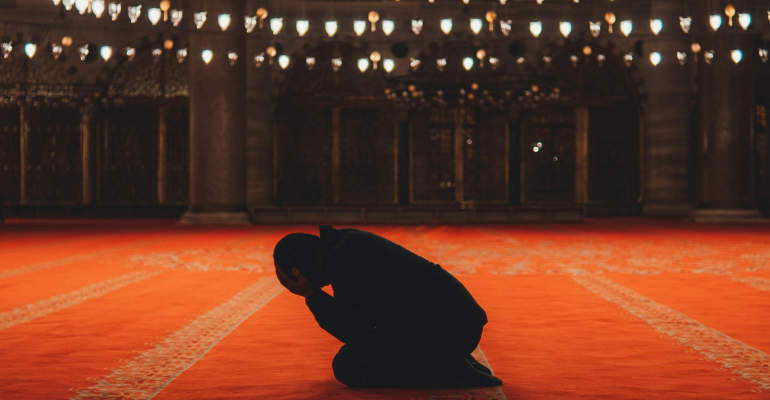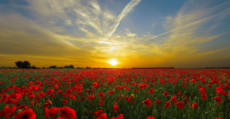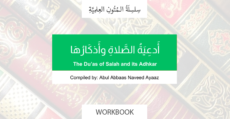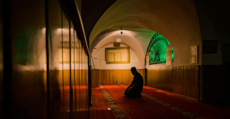Download a PDF version of the adhkār
In the name of Allāh, ar-Raḥmān (the most merciful), ar-Raḥīm (the bestower of mercy).
After finishing Ṣalāh, a person should remain in the same place, facing the Qiblah, and say the following dhikr.
These adhkār are said individually; saying them in unison or congregation was not the practice of the Prophet ﷺ and his Companions, therefore this action is a Bid’ah.
The Prophet ﷺ would count the adhkār using his fingers and/or fingertips.
اللهُ أَكبَر
Allāhu akbar
Allāh is the greatest
[Narrated by Ibn ‘Abbas; Collected by: al-Bukhārī]
اسْتَغْفِرُ اللَّهَ ، اسْتَغْفِرُ اللَّهَ ، اسْتَغْفِرُ اللَّهَ
Astaghfir-ullāh, astaghfir-ullāh, astaghfir-ullāh.
I ask Allāh for forgiveness; I ask Allāh for forgiveness; I ask Allāh for forgiveness.
[Narrated by Thawbān; Collected by Muslim]
اللَّهُمَّ أَنْتَ السَّلاَمُ ، وَمِنْكَ السَّلَامُ ، تَبَارَكْتَ يَا ذَا الْجَلَالِ وَالإِكْرَام
Allāhumma anta as-salām, wa minka as-salām, tabārakta yā dhal jalāli wal ikrām.
O Allāh, You are as-Salām and from You is all peace, Blessed are You, O Possessor of majesty and honour.
[Narrated by Thawbān; Collected by Muslim]
اللَّهُمَّ أعِنِّي عَلَى ذِكْرِكَ وَشُكْرِكَ وَحُسْنِ عِبَادَتِكَ
Allāhumma a’innī ‘alā dhikrika wa shukrika wa ḥusni ‘ibādtik.
O Allāh, help me to remember You, to thank You, and to worship You in the best of manners.
[Narrated by Mu’ādh; Collected by Abu Dawūd]
لَا إلَهَ إِلاَّ اللَّهُ وَحْدَهُ لَا شَرِيكَ لَهُ، لَهُ الْمُلْكُ وَلَهُ الْحَمْدُ وَهُوَ عَلَى كُلِّ شَيْءٍ قَدِيرٌ
Lā ilāha illa Allāh, waḥdahu lā sharīka lahū, lahul-mulku wa lahul ḥamdu, wahuwa ‘alā kulli shay in qadīr.
None is worthy of worship except Allāh, alone, without partner. To Him belongs all sovereignty and praise, and He has power over all things. [Ten times after Fajr Prayer and Maghrib Prayer]
[Narrated by Mughīrah; Collected by al-Bukhārī & Muslim]
اللَّهُمَّ لَا مَانِعَ لِمَا أَعْطَيْتَ ، وَلَا مُعْطِيَ لِمَا مَنَعْتَ ، وَلَا يَنْفَعُ ذَا الْجَدِّ مِنْكَ الْجَدُّ
Allāhumma lā māni’a limā a’tāyta, wa lā mu’tia limā mana’ta, wa lā yanfa’u dhal-jaddi minka al-jadd
O Allāh, none can prevent what You have willed to bestow. And none can bestow what You have willed to prevent. And no wealth or majesty can benefit anyone, as from You is all wealth and majesty.
[Narrated by Mughīrah; Collected by al-Bukhārī & Muslim]
لَا إِلَهَ إِلَاَّ اللَّهُ ، وَلَا نَعْبُدُ إِلَاَّ إِيَّاهُ ، لَهُ النِّعْمَةُ ، وَلَهُ الْفَضْلُ ، وَلَهُ الثَّنَاءُ الْحَسَنُ ، لَا إِلَهَ إِلاَّ اللَّهُ مُخْلِصِينَ لَهُ الدِّينَ وَلَوْ كَرِهَ الْكَافِرُون
Lā ilāha illa Allāh, wa lā na’budu illa iyyāh, lahū an-ni’matu wa lahul-fadlu, wa lahū ath-thanā al-ḥasanu, lā ilāha illa Allāh, mukhliṣīna lahū ad-dīn wa law karihal-kāfirūn
None is worthy of worship except Allāh, and we worship none except Him. For Him is all favour, grace and glorious praise, and He has power over all things. None is worthy of worship except Allāh and we are sincere in faith and devotion to Him although the disbelievers detest it.
[Narrated by ‘Abdullāh Ibn Zubayr; Collected by Muslim]
اللَّهُ لَا إِلَٰهَ إِلَّا هُوَ الْحَيُّ الْقَيُّومُ ۚ لَا تَأْخُذُهُ سِنَةٌ وَلَا نَوْمٌ ۚ لَّهُ مَا فِي السَّمَاوَاتِ وَمَا فِي الْأَرْضِ ۗ مَن ذَا الَّذِي يَشْفَعُ عِندَهُ إِلَّا بِإِذْنِهِ ۚ يَعْلَمُ مَا بَيْنَ أَيْدِيهِمْ وَمَا خَلْفَهُمْ ۖ وَلَا يُحِيطُونَ بِشَيْءٍ مِّنْ عِلْمِهِ إِلَّا بِمَا شَاءَ ۚ وَسِعَ كُرْسِيُّهُ السَّمَاوَاتِ وَالْأَرْضَ ۖ وَلَا يَئُودُهُ حِفْظُهُمَا ۚ وَهُوَ الْعَلِيُّ الْعَظِيمُ
Allāhu lā ilāha illa huwal-ḥayul qayyyūm, lā ta.khudhuhū sinatuwwa lā nawm; lahū mā fissamāwāti wa mā fil-ard, man dhalladhī yashfa’u ‘indahū illā bi idhnih, ya’lamu mā bayna aydīhim wa mā khalfahum,
wa lā yuḥītūna bi shay’in min ‘ilmihī illā bi māshā. wasi’a kursiyyuhus-samā wāti wal ard, wa lā ya’ūduhū ḥifẓuhumā wa huwal ‘aliyyul ‘aẓīm.
Allāh – there is no deity except Him, the ever-living, the sustainer of [all] existence. Neither drowsiness overtakes Him nor sleep. To Him belongs whatever is in the heavens and whatever is on the earth. Who is it that can intercede with Him except by His permission? He knows what is [presently] before them and what will be after them, and they encompass not a thing of His knowledge except for what He wills. His Kursiyy extends over the heavens and the earth, and their preservation tires Him not. And He is the most high, the most great.
[Narrated by Abu Hurayrah; Collected by an-Nasāī]
قُلْ هُوَ اللَّهُ أَحَدٌ * اللَّهُ الصَّمَدُ * لَمْ يَلِدْ وَلَمْ يُولَدْ * وَلَمْ يَكُن لَّهُ كُفُوًا أَحَدٌ
Qul huwa Allāhu aḥad. Alaalahu -ṣamad. Lam yalid walam yūlad. Walam yakun-lahu kufuwan aḥad.
Say, “He is Allāh, [who is] One. Allāh, the Eternal Refuge. He neither begets nor is born. Nor is there to Him any equivalent”.
[Once after every Prayer, except after Fajr and Maghrib which is 3 times]
[Narrated by ‘Abdullah Ibn Khubayb; Collected by Abu Dawūd]
قُلْ أَعُوذُ بِرَبِّ الْفَلَقِ * مِن شَرِّ مَا خَلَقَ * وَمِن شَرِّ غَاسِقٍ إِذَا وَقَبَ * وَمِن شَرِّ النَّفَّاثَاتِ فِي الْعُقَدِ * وَمِن شَرِّ حَاسِدٍ إِذَا حَسَدَ
Qul a’ūdhu bi rabbil-falaq. Min sharri mā khalaq. Wa min sharri ghāsiqin idhā waqab. Wa min sharrin-naffāthāti fil-‘uqad. Wa min sharri ḥāsidin idhā ḥasad.
Say, “I seek refuge in the Lord of daybreak. From the evil of that which He created. And from the evil of darkness when it settles. And from the evil of the blowers in knots. And from the evil of an envier when he envies”.
(Once after every Prayer, except after Fajr and Maghrib which is 3 times)
[Narrated by ‘Abdullah Ibn Khubayb; Collected by Abu Dawūd]
قُلْ أَعُوذُ بِرَبِّ النَّاسِ * مَلِكِ النَّاسِ* إِلَٰهِ النَّاسِ * مِن شَرِّ الْوَسْوَاسِ الْخَنَّاسِ * الَّذِي يُوَسْوِسُ فِي صُدُورِ النَّاسِ * مِنَ الْجِنَّةِ وَالنَّاسِ
Qul a’ūdhu bi rabbin-nās. Malikin-nās. Ilahin-nās. Min sharril waswāsil khannnās. Alladhī yuwaswisu fī ṣudūrin nās. Minal jinnati wan-nās.
Say, “I seek refuge in the Lord of mankind. The Sovereign of mankind. The God of mankind. From the evil of the retreating whisperer. Who whispers [evil] into the breasts of mankind. From among the jinn and mankind”.
(Once after every Prayer, except after Fajr and Maghrib which is 3 times)
[Narrated by ‘Abdullah Ibn Khubayb; Collected by Abu Dawūd]
سُـبحَانَ اللهِ
Subḥān Allāh
Glorified is Allāh above any imperfection.
(33 times)
[Narrated by Abu Hurayrah; Collected by Muslim]
الـحَمـدُ لله
Alḥamdu lillāh
All praise is for Allāh.
(33 times)
[Narrated by Abu Hurayrah; Collected by Muslim]
اللهُ أَكـبَر
Allāhu akbar
Allāh is the greatest.
(33 times)
[Narrated by Abu Hurayrah; Collected by Muslim]
لَا إِلَهَ إِلَاَّ اللَّهُ
Lā ilāha illa Allāh
None is worthy of worship except Allāh.
[Narrated by Abu Hurayrah; Collected by Muslim]
Note: This is not an exhaustive list of adhkār; there are other variations that are authentically narrated from the Prophet ﷺ, and are said after Ṣalāh. For more information, refer to: “Jāmi’ Saḥīḥ al-Adhkār” by al-Imām al-Albāni, “al-Adhkār” by al-Ḥafiẓ an-Nawawi, and “Fortification of the Muslim” by Shaykh Sa’īd al-Qaḥtāni – may Allāh bestow His mercy on them all.
Compiled by: Abul Abbaas Naveed Ayaaz
Preston, Lancashire
21 Rabee’ al-Awwal 1445h,
Corresponding to: Friday 6 October 2023




